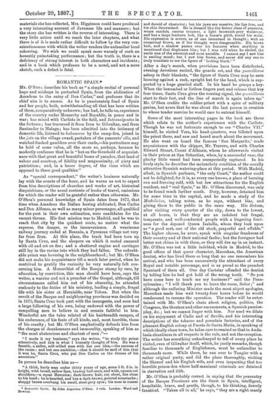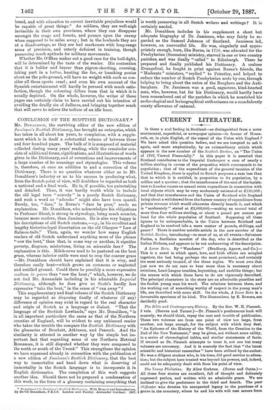ROMANTIC SPAIN.*
Mu O'SHEi describes his book as "a simple recital of personal Imps and mishaps in perturbed Spain, from the abdication of Amadeus to the entry of Don Carlos," and professes that its chief aim is to amuse. As he is passionately fond of Spain and her people, both, notwithstanding all that has been written of them, comparatively unknown; has had, he tells us, experience of the country under Monarchy and Republic, in peace and in war ; has mixed with Carlists in the field, and Intransigentes in the fortress ; has traversed it from Iron to Gibraltar, and from Santander to Malaga ; has been admitted into the intimacy of domestic life, listened to habaneras by the camp-fire, joined in the jota on the village sward, partaken of the peasants' olla, and watched flushed gamblers over their cards,—his portraiture may be held of some value, all the more so, perhaps, because he modestly confesses that he is "but on the threshold of acquaint- ance with that great and beautiful home of paradox, that laud of valour and courtesy, of fidelity and magnanimity, of piety and patriotism ; and, in a lesser degree, of the vices which are opposed to these good qualities."
As "special correspondent," the writer's business naturally lay with the events of the hour, and he warns us not to expect from him descriptions of churches and works of art, historical disquisitions, or the usual contents of books of travel, omissions for which the reader will be grateful rather than otherwise. Mr. O'Shea's personal knowledge of Spain dates from 1873, that time when Amadeus the Italian having abdicated, Don Carlos and Don Alfonso, as well as many minor personages, all qualified for the post in their own estimation, were candidates for the vacant throne. His first mission was to Madrid, and he was to reach that city by the quickest route, no matter what the expense, the danger, or the inconvenience. A wearisome railway journey ended at Beasain, a Pyrenean village not very far from Iran. At this place, the track had been torn up by Santa Cruz, and the sleepers on which it rested smeared with oil and set on fire ; and a shattered engine and carriages still lay in the ravine into which they had fallen. The redoubt- able priest was hovering in the neighbourhood ; but Mr. O'Shea did not make his acquaintance till a mach later period, when he contrived to gratify the curiosity he very naturally felt con- cerning him. A Monarchist of the Basque stamp by race, by education, by conviction, this man should have been, says the writer, a warrior and not a preacher of the Gospel, although, till circumstances called him out of his obscurity, he attended zealously to the duties of his ministry, leading a simple, frugal life with his sister at Hernialde, near Tolosa. But when the revolt of the Basque and neighbouring provinces was decided on in 1870, Santa Cruz took part with the insurgents, and soon had a large following of his own, being endowed with the power of compelling men to believe in and remain faithful to him. Wonderful are the tales related of his hairbreadth escapes, of his endurance, of his feats of all kinds, and, most horrible, those of his cruelty ; but Mr. O'Shea emphatically defends him from the charges of drunkenness and immorality, speaking of him as "the most abstemious and chastest of men :"— " I made it my business," says the writer, "to study the priest attentively, and this is what I honestly thought of him. He was a fanatic, a sullen, self-willed man with but one idea,—the success of the cause ; and but one ambition,—that it should be said of him that
it was he, Santa Cruz, who put Don Carlos on the throne of his ancestors."
In person be describes him as— "A thick, burly man under thirty years of age, some 5 ft- Sin, in height, with broad, sallow face, brawny brill-neck, and wide, square-set shoulders,—a squat Hercules; dark-brown hair, cut short, lies close to his head ; he is bearded, and has a dark-brown, pointed moustache ; shaggy brows overhang his small, steel-grey eyes; his noes is coarse
• Romantic Spain. By John Augustin O'Shea. 2 vole. London: Ward and Downey.
and devoid of character ; hut his jaws are massive, his lips firm, and his chin determined. He is dressed like the better class of peasants, wears sandals, canvas trousers, a light brownish-grey waistcoat, and has a large leathern belt, like a horse's girth, round his waist. His expression is severe, as of one immersed in thought; with an occasional frown, as if the thought were disagreeable. His brows knit, and a shadow passes over his features when anything is mentioned that displeases him; but I was told when he smiled, the smile was of the sweetest and most amiable. I cannot say I saw him in smiling mood ; but I saw hint frown, and never did any 011e so truly translate to me the figure of ' looking black.'" After a day's march, when provisions have been distributed, evening devotions recited, the guards set, and the guerrilleros asleep in their blankets, "the figure of Santa Cruz may be seen looming against a rock, upright but for the head, which is sup- ported by a huge gnarled staff. In his hand he grasps a key. When the benumbed or listless fingers part and release that key four times, Santa Cruz gives the rousing signal, the guerrilleros start to their feet, and the line of march is again taken up." Mr. O'Shea credits the soldier-priest with a spice of military genius, but avers that be was about the last person in creation to whose tender mercies he would care to entrust himself.
Some of the most interesting pages in the book are those which relate to the author's experiences with the Carlists. Though he was not fortunate enough to see "Charles VII." himself, he visited Vera, his bead-quarters, was billeted upon the priest there, and saw and heard much about the movement. He also went on board the famous 'San Margarita,' made acquaintance with the skipper, Mr. Travers, and with Charles Edward Stuart, Count d'Albanie, whom he afterwards visited in their prison at San Sebastian, when, by a successful ruse, the plucky little vessel had been unexpectedly captured. In his lively style, be describes the melancholy condition of the usually attractive Spanish watering-place at this period. With Madrid, albeit, in Spanish parlance, "the only Court," the author could not be delighted, for it is, as every one knows, a place of burning sun and freezing cold, with but few attractions for the English resident, and "real Spain," as Mr. O'Shea discovered, was only to be found much farther south. Duty, however, detained him for some time in the capital, and he made a study of the Madriledos, taking notes, as he says, without bias, and giving them to the public in the same way. His dictum, after visiting every quarter of the city, down to the lowest, at all hours, is that they are an indolent but frugal, temperate, and well-conducted people with a lingering fond- ness for the deposed Queen Isabella, whom they look upon as "a good sort, one of the old stock, prayerful and affable." The higher classes, he avers, speak with singular frankness of their country and of their national faults; but the foreigner had better not chime in with them, or they will fire up in an instant. Mr. O'Shea was not a little indebted, while in Madrid, to the good offices of that queer character, Maceehan, the American dentist, who has lived there so long that no one remembers his arrival, and who has been successively the attendant of every Royal and notable personage, and is as proud as the proudest Spaniard of them all. One day Castelar offended the dentist by telling him he had got hold of the wrong tooth. "So you have come here to teach me my business ?" said the Penn- sylvanian ; "I will thank you to leave the room, Sailor ;" and although the suffering Minister made the most abject apologies, Maceehan made him wait twenty-four hours before he would condescend to resume the operation. The reader will be enter- tained with Mr. O'Shea's chats about religion, politics, the Congress, the theatres and other amusements, a Spanish passion- play, &c. ; but we cannot linger with him. Nor need we dilate on his enjoyment of Cadiz. and of Seville, and his interesting descriptions of the tobacco and porcelain factories, and of the pleasant English colony at Puerto de Santa Maria, in speaking of
which ideally clean town, he takes care to remind us that in Anda- lusia cleanliness in all respects is the rule, and not the exception.
The writer has something unhackneyed to tell of every place he visited, even of Gibraltar itself, which, he justly remarks, though familiar to thousands of Englishmen, must be unfamiliar to thousands more. While there, he ran over to Tangier with a rather original party, and did the place thoroughly, visiting the Shereef and his English wife, and even inspecting that too horrible prison-den where half-maniacal criminals are detained in starvation and filth.
Mr. O'Shea is probably correct in saying that the peasantry of the Basque Provinces are the finest in Spain, intelligent,
hospitable, brave, and gentle, though, to his thinking, fiercely fanatical "Taken all in all," he says," they are a right manly breed, and with education to correct inevitable prejudices would be capable of great things." As soldiers, they are well-nigh invincible in their own provinces, where they can disappear amongst the crags and forests, and pounce upon the enemy when supposed to be miles away ; but in the lowlands they are at a disadvantage, as they are bad marksmen with long-range arms of precision, and utterly deficient in training, though possessing much aptitude for military movements.
Whether Mr. O'Shea makes out a good case for the bull-fight, will be determined by the taste of the reader. His contention that it is bolder and braver than pigeon-shooting, coursing, taking part in a LaRue, hunting the fox, or knocking ponies about on the polo-ground, will have no weight with such as con- sider all these sports cruel ; and even his own account of the Spanish entertainment will hardly be perused with much satis- faction, though the colouring differs from that in which it is usually depicted. On the whole, however, the writer of these pages can certainly claim to have carried out his intention of avoiding the deadly sin of dullness, and bringing together ranch that will serve to relieve the tedium of an idle hour.



































 Previous page
Previous page